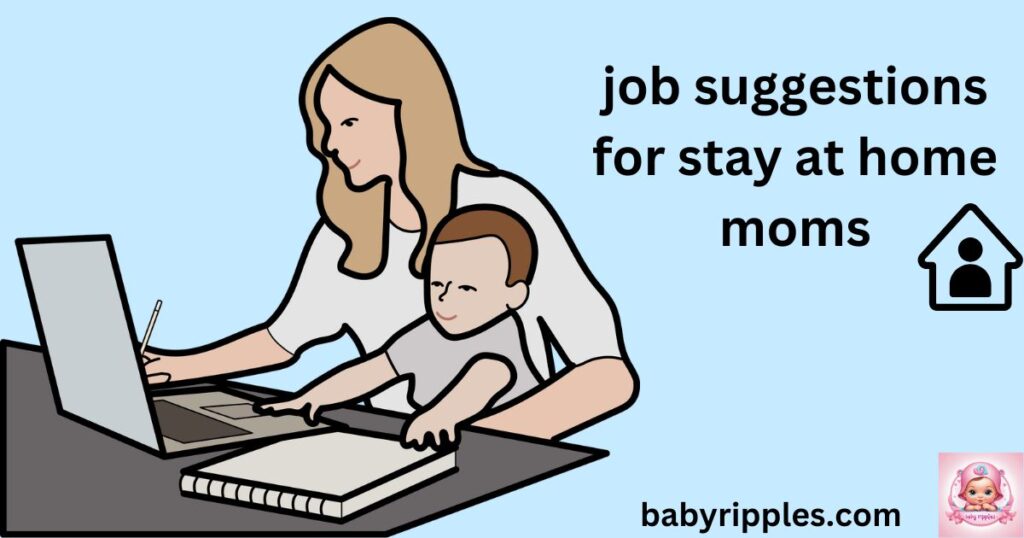Phones, tablets, PCs, and televisions all have screens these days, and they play a vital role in our daily life. However, excessive screen usage can harm children’s social skills, sleep patterns, mental health, and physical health. To promote healthy usage, it is important to have explicit recommendations for screen time by age.From newborns to teenagers, this guide outlines the recommended screen time limits by age. You’ll find age-appropriate rules, doable steps, and some extra advice for striking a balance between screen time and in-person interactions, regardless of whether you’re a new parent or parenting an older child.
You may want to read:Setting Boundaries for Screen Time
What is Screen Time?
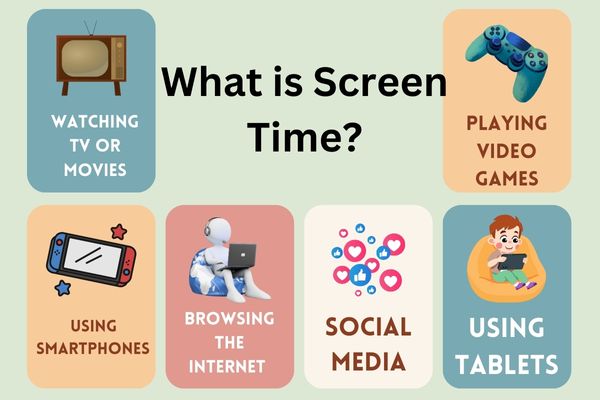
Screen time includes any time spent on a device with a screen, such as:
- Watching TV or movies
- Playing video games
- Using smartphones or tablets
- Browsing the internet or social media
According to experts, like the American Academy of Pediatrics (AAP), limiting screen time is especially important for kids as they grow and develop. Let’s explore current recommendations for screen time by age and what that looks like for different age groups.
You may want to read: 10 Reasons Why Screen Time is Bad for Kids
Recommendations for Screen Time by Age
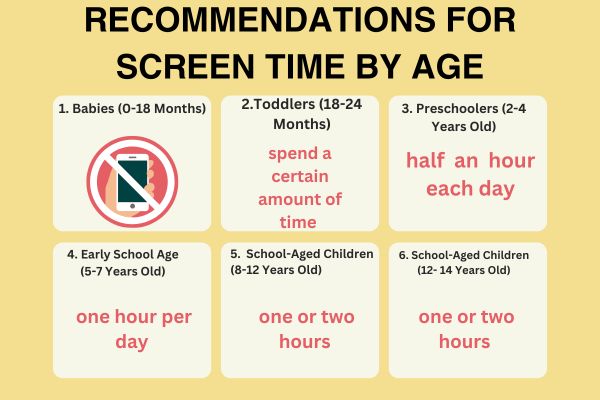
1. Babies (0-18 Months)
With the exception of video conversations with relatives, babies under the age of 18 months are advised to avoid screen usage altogether. Human interactions are the best way for babies to learn, particularly when it comes to real-world sounds and facial emotions.
Why Can’t Babies Use Screen Time?
Direct engagement is essential for linguistic and emotional development in babies, and screens can impede their rapid brain development.
Screen time exceptions:
Video conferencing with loved ones can be a unique pastime. Video conversations are an interactive experience for babies since they frequently recognize familiar faces.
2. Toddlers (18-24 Months)
Toddlers aged 18 to 24 months are permitted to spend a certain amount of time on screens, but only if they are watching high-quality, instructive content with a parent or other adult present. Toddlers benefit from watching together because it allows them to digest and learn from what they see on the television.
Suggested Screen Activities:
Interactive educational apps that are used under supervision; educational programs that introduce concepts like numbers, colors, and animals.
3. Preschoolers (2-4 Years Old)
The age-appropriate screen time recommendation for preschoolers is up to one hour of high-quality entertainment each day. Ideally, this screen time should be shared to promote education and dialogue.
Screen time types include:
Programs that promote learning through counting, tales, and music.
Games that present fundamental ideas in entertaining, engaging ways.
Why Limit Screen Time for Preschoolers?
Too much screen time can interfere with active play, which is crucial for this age.
Kids learn social skills and motor development through hands-on play.
4. Early School Age (5-7 Years Old)
At this point, the youngster may start using screens on a daily basis, particularly for schoolwork. Limiting recreational screen usage to one hour per day is advised. However, there is no need to limit screen time for educational purposes like studying or reading applications.
Tips for Balanced Screen Use:
Encourage co-viewing of educational content.
Set specific times for watching or playing on screens, like after homework or as a weekend treat.
5. School-Aged Children (8-12 Years Old)
It is advised that youngsters between the ages of 8 and 12 spend no more than one or two hours a day using screens for leisure. Children at this age will probably be utilizing screens for schoolwork and might be more drawn to screen-based amusement activities.
Finding a Balance Between Screen Time and Other Activities:
Establish limits on the usage of screens, such as prohibiting them at the dinner table. Promote pastimes like reading, athletics, and crafts that don’t require screens.
you may want to read: What to Do Instead of Screen Time
Recommended Screen Time for Teenagers (15-18 Years Old)
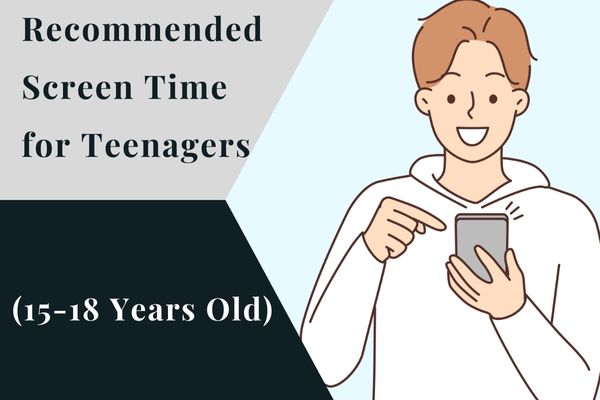
Teens are more self-reliant, and their social life are heavily reliant on screens. Although there isn’t a hard limit on how much screen time is appropriate for teenagers by age, it’s crucial to set regular boundaries to promote a healthy balance.
Advice for Balancing Screen Time:
Discuss the value of balance with your teenager. Describe the negative effects of excessive screen usage on sleep and mental health.
Establish “screen-free” areas in the house, such as the dining room or the bedroom.
Promote screen-free activities like exercising, getting outside, and taking up hobbies.
General Tips to Manage Screen Time for Kids
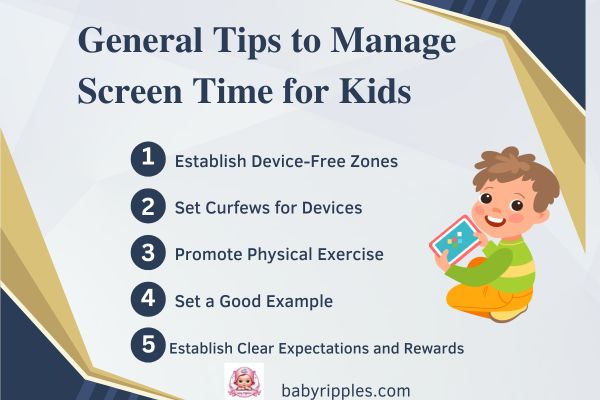
Managing screen time effectively means setting clear rules and sticking to them. Here are some helpful tips:
1: Establish Device-Free Zones:
Promote the use of devices in public areas and keep displays out of bedrooms. This lessens the temptation to sneak screen time and aids with usage monitoring.
2. Set Curfews for Devices:
Establishing a time in the evening for children and teenagers to put away their screens will help them sleep better.
3. Promote Physical Exercise:
Encourage screen-free activities like family games, crafts, and sports. Engaging in physical activity promotes healthy growth and lessens the desire to use electronics when bored.
4. Establish Clear Expectations and Rewards:
Define guidelines for screen time and provide non-material incentives, such as more screen time on the weekends, to encourage compliance.
5. Set a Good Example for Screen Use:
Kids pick up on behaviors from their parents, so if they observe you controlling your screen time, they’re more likely to follow suit.
Wrapping up:
recommendations for screen time by age allows kids to benefit from digital media without endangering their growth and well-being. These guidelines for kids’ screen time can help you develop a well-rounded strategy that promotes their wellbeing and prepares them for a positive future relationship with technology.
Frequently Asked Questions about recommendations for screen time by age
1. What is considered screen time for babies?
Screen time includes all time spent using screens such as phones, tablets, and televisions. For babies, the recommendation is to avoid screen time entirely, except for video chats with family.
2. What is the recommended amount of screen time by age?
For children under 18 months, no screen time is recommended. Toddlers (18-24 months) should have limited, co-viewed screen time. Preschoolers (2-4 years) can have up to 1 hour per day, while school-aged kids should aim for 1-2 hours.
3. How much screen time is healthy for teens?
While there’s no strict limit for teenagers, parents should encourage balance and set consistent boundaries, particularly around recreational screen use




